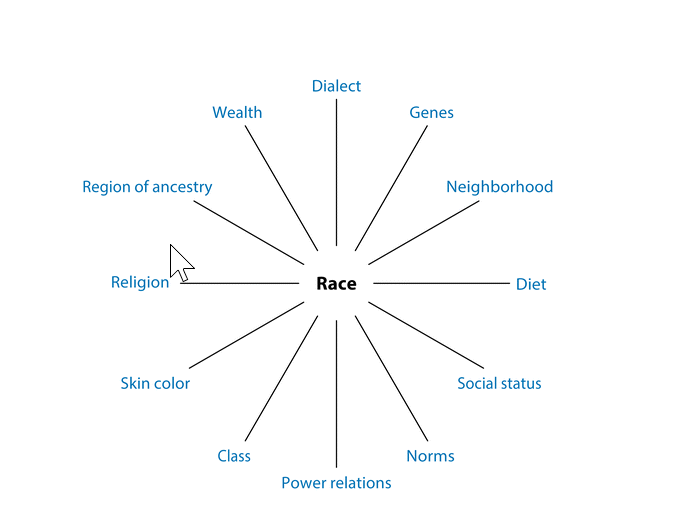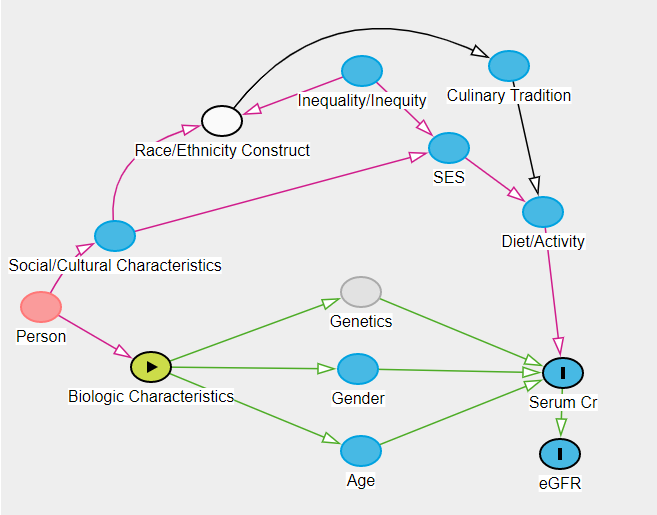1/ Tweetorial at use of Race/Ethnicity in prediction models, specifically looking at eGFR based on CKD-EPI formula.
eGFR = estimated GFR http://ckdepi.org/
eGFR = estimated GFR http://ckdepi.org/
2/ First some background.
GFR can be directly measured, traditionally by measuring iothalamate clearance. This is process is time consuming, costly, and rather inconvenient. So for greater ease, we attempt to estimate GFR (eGFR) based on serum measurements of Creatinine.
GFR can be directly measured, traditionally by measuring iothalamate clearance. This is process is time consuming, costly, and rather inconvenient. So for greater ease, we attempt to estimate GFR (eGFR) based on serum measurements of Creatinine.
3/ Prediction Models:
The way this works is by getting lots of values of Creatinine, comparing them to know values of GFR, and then putting together a prediction model to create a formula that lets us closely approximate the GFR values.
The way this works is by getting lots of values of Creatinine, comparing them to know values of GFR, and then putting together a prediction model to create a formula that lets us closely approximate the GFR values.
4/ The most important aspect here is the prediction model has to be calibrated & validated. Its not good if the eGFR is wrong! Calibrating the model requires adjusting based on other factors that can improve the prognostic value of the equation. https://jamanetwork.com/journals/jama/article-abstract/2656816
5/ The Creatinine EPI-CKD model, based on available data-sets at that time, found that Age, Sex, and Race adjustments offered the best "improvement" predictions. Since creatinine is influenced by activity level, diet, and (presumably) genetics, this was seen as plausible model.
6/ Not all predictor variables are causal.
A confusing point!
For example, a mortality model might use hospitalization to improve prediction of death. But the hospital itself is not causing death; it is merely a surrogate for disease severity (which is harder to measure).
A confusing point!
For example, a mortality model might use hospitalization to improve prediction of death. But the hospital itself is not causing death; it is merely a surrogate for disease severity (which is harder to measure).
7/ Many people think of age, sex, and race as causal predictors of eGFR. Here is one example of a causal model, where race is a surrogate for (unmeasured) genetics:
8/ However, their is a problem with this approach; race/ethnicity is considered a complex social construct that is more than just genetics or skin pigmentation.
https://www.annualreviews.org/doi/abs/10.1146/annurev-polisci-032015-010015
https://www.annualreviews.org/doi/abs/10.1146/annurev-polisci-032015-010015
9/ Here is one example of a eGFR causal model using social constructs. Factors such at inequality, Socio-Economic-Status, cultural culinary habits, etc can influence diet/activity & serum Cr values.
10/ In such a model, inadequate consideration for confounders while controlling for race is going to bias eGFR predictions.
For the 10 studies used to calibrate the CKD-EPI eGFR model, demographic info is available for some of the major data sets.
Ref:
https://rajking.github.io/ckdepi/
For the 10 studies used to calibrate the CKD-EPI eGFR model, demographic info is available for some of the major data sets.
Ref:
https://rajking.github.io/ckdepi/
11/ The majority of AA patients came from the AASK trial. The demographic data of the AASK study had lower income, education, & more smokers compared to available demographic data in the other studies.
12/ Their two large problems for the Cr based prediction model.
First, the different cohorts of data & study sites can have lots of variations. To avoid accidentally over-weighting one study, its important to do a cluster analaysis, which the CKD-EPI study does not do.
First, the different cohorts of data & study sites can have lots of variations. To avoid accidentally over-weighting one study, its important to do a cluster analaysis, which the CKD-EPI study does not do.
13/ Second, the patients in the AASK trial had SES differences (jobs, environment, diet, income, etc) that would confound/bias eGFR predictions.
(Note, even if we could adjust for SES, we still cannot account for all confounders related to race)
https://jamanetwork.com/journals/jama/fullarticle/2703957
(Note, even if we could adjust for SES, we still cannot account for all confounders related to race)
https://jamanetwork.com/journals/jama/fullarticle/2703957
14/ Interestingly, we can also estimate GFR values using Cystatin C (its more expensive), which is not influenced by diet/activity.
The prediction models using cystatin-c did not find improved prediction when adjusting for race, as they do for age/sex. http://ckdepi.org/equations/estimating-equations/cystatin-c-based-equations/
The prediction models using cystatin-c did not find improved prediction when adjusting for race, as they do for age/sex. http://ckdepi.org/equations/estimating-equations/cystatin-c-based-equations/
15/ Should we continue to use race/ethnicity in the Creatinine CKD-EPI prediction model?
After reviewing the data, its hard to have confidence in it.
Additionally, their are concerns that inaccurate eGFR can cause harm if it influences entering transplant wait lists, etc.
After reviewing the data, its hard to have confidence in it.
Additionally, their are concerns that inaccurate eGFR can cause harm if it influences entering transplant wait lists, etc.
16/ For common use of Creatinine eGFR like dosing adjustment, etc, using age/sex alone is probably still sufficient.
For more important decisions, perhaps we need to do more decision analysis to decide when Cystatin C or direct (iothalimate) measures offer greater utility.
For more important decisions, perhaps we need to do more decision analysis to decide when Cystatin C or direct (iothalimate) measures offer greater utility.
17/ A more difficult question: should we continue to use race/ethnicity for biomedical prediction models in general?
This is a more nuanced topic, to which I dont think their is one answer.
This is a more nuanced topic, to which I dont think their is one answer.
18/ Not all variables in prediction models are causal. Models specifically looking at predicting social determinants of health could use race/ethnicity if done with appreciation of the complex components involved.
19/ The ASCVD risk prediction, for example, considers race/ethnicity. Is race/ethnicity is "causal", or a surrogate for social determinants of health? Should we remove race? Would removing race cause harm if it worsens prediction? Should we let patients decide?
20/ If we think race/ethnicity is important for prediction, we should do our best to define how and why.
And if we want to collect data, we should do so with a more thoughtful, multi-dimensional understanding of identify. https://jamanetwork.com/journals/jama/article-abstract/2703954
And if we want to collect data, we should do so with a more thoughtful, multi-dimensional understanding of identify. https://jamanetwork.com/journals/jama/article-abstract/2703954
21/ We should be thoughtful about any aspect of a person's identity, and the utility of using such information to inform decision making.
/End
/End

 Read on Twitter
Read on Twitter






